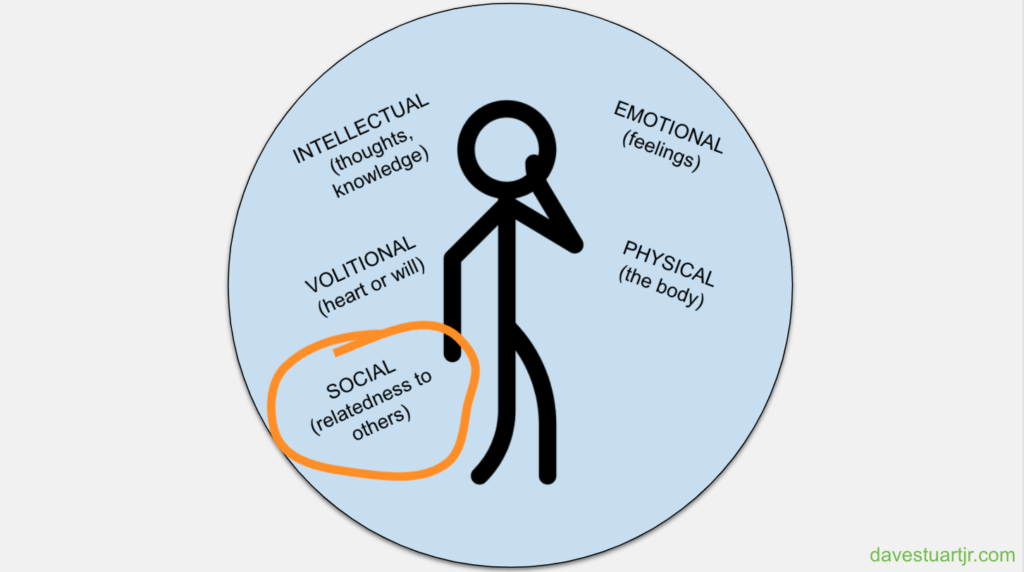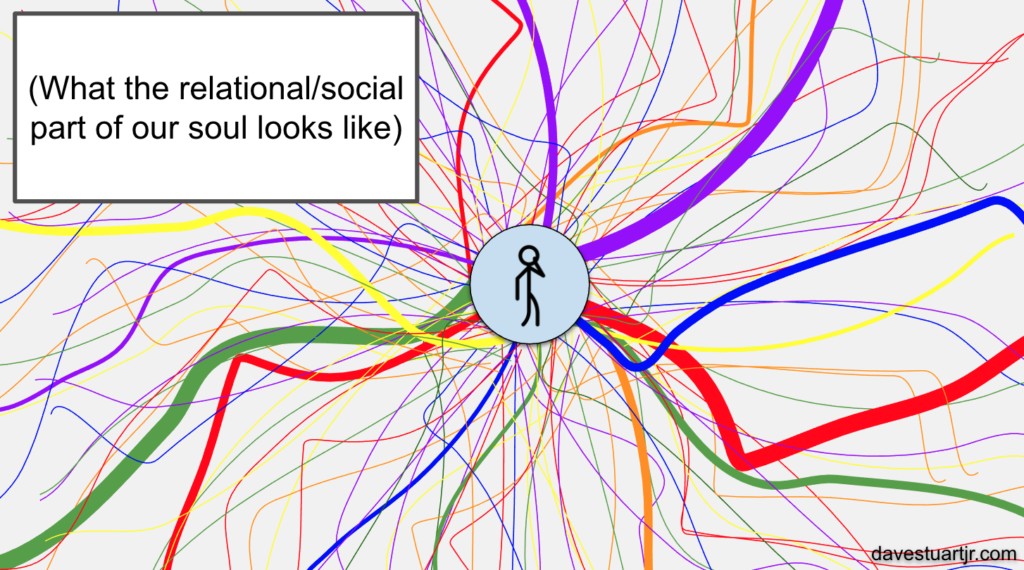(This post is a quick interlude in our series on depressurizing the teacher soul. Don't skip it! Its ideas will help with subsequent posts.)
Early on in his career, back when he was still a seminary student, Fred Rogers was stung by the judgment bug.
As part of his studies, Rogers and his classmates visited different churches on the weekends to see how different preachers preached. One weekend, his group headed to the church of a well-respected preacher, but once the service began, they learned that the preacher was away, and they'd be hearing a substitute.
Rogers was disappointed, but he had heard excellent substitutes before, so he settled in to learn. To his dismay, however, the substitute wasn't good. The sermon wandered, seemingly without aim. For Fred, it was suffering — as the message plodded on, his mental list of errors, omissions, and gaffes got larger and larger.
I'll let Fred's longtime correspondent Amy Hollingsworth pick up the story from here:
The sermon went against everything Fred was learning in seminary. When it ended (“mercifully,” he later told me), he turned to the friend beside him to commiserate. But before he could say anything, his words were muted by the tears he saw streaming down her face.
“He said exactly what I needed to hear,” she whispered.
That bungle of a sermon was exactly what she needed to hear? Fred didn't know what to say. But as he began to ponder the gulf between their reactions, he realized that the essential difference lay within: she had come in need and he had come in judgment. …
That experience shaped the rest of Fred Rogers' life. And it changed his Neighborhood as well. He not only committed to reserving judgment, but he also opened himself up to the mystery of holy ground.
From p. 33 of The Simple Faith of Mr. Rogers by Amy Hollingsworth
From the moment I first read it, I have deeply loved that story. What would happen to the pressure in our souls if you and I “committed to reserve judgment,” as Fred Rogers did early in his career? What might we lose? What might we gain?
We've been doing a series on soul depressurization for teachers — not because we're self-obsessed navel-gazers, but because we're smart and strategic. And today we're pausing from a focus on strategies to zoom out and get a better hold on the social aspect of us.
The social aspect of us is special because it's the part of us that's not just us.
You remember my technical diagram of the five-part soul, right? It looks like this:

Well, there's an inaccuracy with that diagram. (Shocking, I know.) The social/relational part of us doesn't really look like that. When you change your metaphysical lens filter, you can actually see it more clearly.
It looks like this:

The thicker threads are folks you're in life with the most — spouse, partner, kids, best friends, family of origin — but the tiniest threads are folks like me and your old college roommate who posts to Facebook and the newscaster you watch each night and the student who sits in the back corner and keeps entirely to herself.
Sometimes I just sit and think about all those thin threads, and I marvel. All of my students and all of my colleagues and all of my friends and all of my neighbors — they shape my soul. I've never met another person or encountered another person's words that were inconsequential to who I'll be tomorrow.
Which brings us back to judgment
Fred Rogers didn't let go of judgment because it was the morally correct thing to do. He let go of judgment because he realized it didn't make sense.
It was silly.
Fred's perception of reality was just a sliver; so why go on pretending that his sliver was the definitive one? What was the value in sitting there during a sermon, miserably cataloguing mistakes, when the person next to him was getting a heart message, was deepening spiritually?
It reminds me of the old King James saying: “Judge not, lest ye be judged.”
Lots of folks take this to be a religious rule. So they grit their teeth, and they try not to judge other people.
But the speaker wasn't proposing a rule to follow any more than Newton was with gravity. He was indicating a law — a fundamental reality. He was saying, “Listen: you don't know it all. You're not that big. Judging is an inner whirlpool. You'll end up drowned, separated, and lonely. It'll bring you down.” [1]
I remember early on in my career working with some teachers who were pretty bad at their jobs. I'd find myself enjoying conversations with colleagues that maligned those teachers.
I'll say it — it felt good to judge. It felt safe. It was inclusion by exclusion.
But driving home one day, I had a realization: a person's value doesn't come from their performance. Because we're not our jobs. We're not our actions. We're not our competencies.
We're people. People are more than performance.
What this does for the soul
When Fred Rogers committed himself against judging, he opened up a permanent depressurization valve on his soul. He didn't need to measure himself against other people; he didn't need to worry if other people measured him. He just needed to show up, do his best, and trust forces beyond himself to fill in any gaps — just like they did for his friend during the sermon.
It's not a simple decision that frees us from judgment — it's habituation via the other elements of our souls.
- We use our intellects to think on ideas that free us from judgment — ideas like, “I'm not that big,” and “People aren't their jobs.”
- We use our bodies to acknowledge the goodness in others, especially those we may be jealous of [2]. We write thank-you notes with our hands, smile at people with our faces, speak with our mouths good things about folks who are or aren't present.
- We give expression to positive emotions about others — “I really like to be with you,” “I really enjoyed listening to you speak during today's discussion” — and give examination to negative feelings, asking, “What's at the root of me feeling badly toward this person? What pain of mine did they step on?”
Practical takeaways
So before we end, some quick practical takeaways:
1) Fred Rogers was able to de-habituate judgment through at least two means:
- He accepted that it was foolish, no matter the circumstances.
- He decided to be done with it.
I'm sure it wasn't an instant change. But when his mind and his will aligned against judging others, he was on the path to change.
2) You and I do have to give feedback sometimes, but it never has to be a personal judgment.
It can be business. (See the final minute of the below video for a bit on this.)
(Not seeing a video? Click here. Not subscribed to the YouTube channel? Get ready for some good vibes!)
I think this applies whether you're an administrator giving feedback to a teacher or a parapro giving feedback to a student. We MUST give feedback if we're to maximize our contribution to the mastery outcomes of those we serve.
On the path to a less pressured life
I hope this article gave you helpful things to think about.
Much love,
DSJR
Got thoughts on this topic? I always love to read them in the comments.
Appreciating the depressurization series? Make sure you're subscribed! All subscribing does is lets me send these posts right to your inbox.
Dig Deeper:
- Interestingly, the judgment line in the Sermon on the Mount comes right after the passage on anxiety. I don't think it's coincidence. In my experience, judging others is both a cause and an effect of anxiety.
- Jealousy is the gut-level judgment that someone has it better than they deserve and that I deserve to have it as good as them.
- Got so much work that you don't have time for this practice? Try the following posts on making workload behave:
- A Shift then a Skip: Here's How One Teacher's Job Changed with a Simple Change in Thinking
- How to Get Better at Satisficing as an Educator
- The Best Question for Helping You Simplify Lessons, Curricula, Policies, or Procedures
- A Few Helpful Ideas for Resting as an Educator
- Let's Pick Some Sled Dogs
- We're Too Hospitable to Pointlessness
- To Decide is to Cut
- I'm currently working on a spring 2022 PD experience that's going to help with one of the biggest stressors for secondary teachers in the world today: student motivation. Want first dibs? Sign up here.
- I'm doing a series on YouTube right now called “Thoughts Worth Thinkin'.” It's tangental to this blog series on depressurization. Check out the playlist here and please subscribe!
Lauren Ficaro says
Thank you.
Dave Stuart Jr. says
Boyd says
Thank you for expounding on judgement and how it is really a tricky business to judge. I have a quote on my wall from the poet Lucille Clifton that helps me with this.
“Every pair of eyes facing you has probably experienced something you could not endure.”
Dave Stuart Jr. (@davestuartjr) says
Love that, Boyd.
Patrice Parks says
This is exactly what I needed today. Thank you.
Dave Stuart Jr. (@davestuartjr) says
Patrice, I am so glad